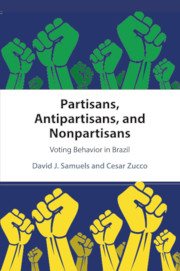Book contents
- Frontmatter
- Contents
- List of Figures
- List of Tables
- Acknowledgments
- 1 Introduction
- 2 Partisanship and Antipartisanship in Brazil
- 3 The Strength of Partisan Attitudes in Brazil
- 4 The Rise (and Decline) of Petismo
- 5 Partisanship, Antipartisanship, and Voting Behavior
- 6 Partisanship and Antipartisanship in Comparative Perspective
- 7 Conclusion: Parties, Voters, and Brazilian Democracy
- References
- Index
6 - Partisanship and Antipartisanship in Comparative Perspective
Published online by Cambridge University Press: 10 May 2018
- Frontmatter
- Contents
- List of Figures
- List of Tables
- Acknowledgments
- 1 Introduction
- 2 Partisanship and Antipartisanship in Brazil
- 3 The Strength of Partisan Attitudes in Brazil
- 4 The Rise (and Decline) of Petismo
- 5 Partisanship, Antipartisanship, and Voting Behavior
- 6 Partisanship and Antipartisanship in Comparative Perspective
- 7 Conclusion: Parties, Voters, and Brazilian Democracy
- References
- Index
Summary
Since the publication of The American Voter (Campbell et al. 1960), political scientists have regarded positive partisanship as critically important – almost a “master variable” for explaining political participation, vote choice, candidate evaluation, and attitudes toward public policies. By contrast, relatively little research on negative partisanship exists. Does negative partisanship have the same effects in other countries as it does in Brazil?
This chapter demonstrates that our claim about the importance of negative partisanship can be generalized. Individuals can have either positive or negative partisan attitudes – or both – in any country around the world, and such attitudes play an important role in vote choice. Scholars of parties and voting behavior who ignore the independent role that negative partisanship can play are missing a potentially large part of the story about individual motivation to vote or otherwise participate in politics.
Most research on negative partisanship has been conducted in a single country (e.g., Maggiotto & Piereson 1977; Caruana, McGregor, & Stephenson 2015; McGregor, Caruana, & Stephenson 2015) or in countries with single-member districts (Medeiros & Noël 2013). (Exceptions include Rose … Mishler [1998] and Vlachová [2001]). Our exploration of Brazil suggests that antipartisanship can matter even in multiparty, proportional representation (PR) electoral systems. Mayer (2017) is the only large cross-national study that we know of. She used surveys from the third module of the Comparative Study of Electoral Systems (CSES) to explore negative partisanship in seventeen European PR systems.
Our approach here is similar to Mayer's, but differs in three ways. First, we incorporate a geographically broader sample, analyzing countries from Latin America, Asia, and North America as well as Europe. Second, we explore negative partisanship at two distinct points in time – about twenty years apart, using CSES surveys from the mid-1990s and the mid-2010s. And third, our conceptualization of negative partisanship departs from Mayer's. Whereas she examined the concurrent effects of positive and negative partisanship on individual voting behavior, allowing individuals to posses both positive and negative partisan attachments, in keeping with earlier chapters in this book we explore whether negative partisanship alone can predict the behavior of individuals who lack a positive partisan attachment.
Information
- Type
- Chapter
- Information
- Partisans, Antipartisans, and NonpartisansVoting Behavior in Brazil, pp. 140 - 159Publisher: Cambridge University PressPrint publication year: 2018
